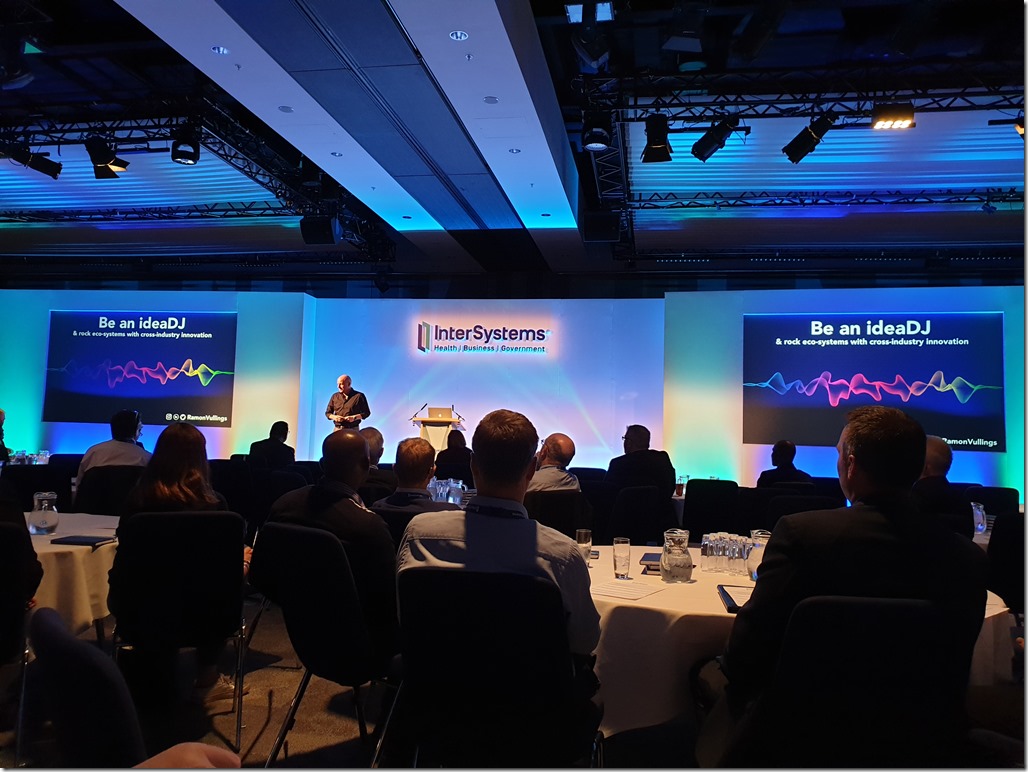Ramon Vullings, author, cross-industry expert, and ideaDJ, was the first speaker at InterSystems Joined-Up Health & Care 2019. He says he has a “critical, intelligent audience” but he wants to “blow your mind a little bit.”
Is there anyone here from Germany, he asks. (No hands). Then: has anyone been on a German train. (A few hands). And who thinks German trains are better than English ones. (Lots of hands). So… he asks: who thinks Germans are very creative people. (No hands).
Exactly, he says, the German rail system is not known for its creativity… yet, as a video he shows demonstrates, German Rail is quite creative. It has, for example, done a lot of work on its apps, to improve people’s travel experience: and that has increased passenger numbers. The lesson: big companies can be as innovative as “young and sexy start ups”. They just need to focus on finding and implementing good ideas.
Vullings goes on to ask his audience how many have good ideas. (A few hands). Brilliant ideas. (Fewer hands). Bad ideas. (Half-hearted hands). It’s ok, he says. Any ideas are good: the challenge is to “combine them in ways that add value.” Bringing ideas together in a way that adds value is what an IdeaDJ does. Specifically, he adds, an IdeaDJ looks for combinations of ideas that create “elegant” solutions. He gave the example of printing a TV on bicycle packaging to encourage shippers to look after it in transit.
Wrong answers and blurring boundaries
Vullings went on to ask his audience to provide ‘wrong’ answers to three questions: what is the capital of Belgium, how many 3D printing start-ups in Europe, and what is the colour of his mother’s car. Getting a complete set of wrong answers is difficult, he points out: people naturally give the right answer to the first question, or guess a colour for the final one that might just be correct.
To get a complete set of wrong answers, he says, people need to think differently: they need to give a colour answer to the city question, or a city answer to the car colour question. Blurring boundaries leads to more creative solutions. And this kind of thinking is particularly important for “wicked problems” like healthcare reform.
Vullings had three top tips for doing this. One: break out of your silos: make sure you are not locked down in jargon; be open to learning from others or, as he put it: “go from Ego to Lego”. Second: Find the right friends and partners; Ikea is working with Adidas, because it can see that people want to work out more; so there are lots of opportunities out there as long as you also “go from ego-system to ecosystem.” Third: find new ways of working: change titles; a Belgian supermarket has introduced a work simplifier to shake things up; find new data; don’t “copy and paste” what has been done before.
In doing this, he acknowledged that it was important to take account of and manage risk. That doesn’t mean doing nothing. And it doesn’t mean “just jumping to success.” There is an area in the middle, what he called “nearlying”: something that is done with the right intentions that hasn’t yet led to the right results; but is getting there. Handled correctly, that leads to “learning” and then “earning.”
So, lots of think about. “And good luck on your IdeaDJ journey.”




